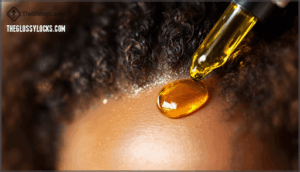This site is supported by our readers. We may earn a commission, at no cost to you, if you purchase through links.

Packed with vitamin E, zinc, and copper, jojoba oil locks moisture deep into each strand while simultaneously soothing your scalp and fighting the fungal issues that derail growth. Whether you’re battling persistent dryness, thinning edges, or stubborn dandruff, jojoba oil for natural hair targets the root problem—literally—by restoring balance to your scalp’s ecosystem.
The result isn’t just softer hair; it’s stronger strands, healthier growth, and the freedom to wear your natural texture without compromise.
Table Of Contents
Key Takeaways
- Jojoba oil is a liquid wax that mimics your scalp’s natural sebum, allowing your hair to recognize and absorb it without greasy buildup that weighs down curls and coils.
- It tackles multiple hair concerns at once—dryness, thinning edges, dandruff, and slow growth—by delivering vitamins E, B-complex, zinc, and copper directly to follicles and strands.
- Use it 1-2 times weekly through direct application, scalp massage, mixing into products, or as a pre-styling treatment, with noticeable results appearing within 2-3 weeks of consistent use.
- Jojoba oil regulates sebum production by working with your scalp’s natural chemistry rather than against it, creating balanced conditions that prevent both excess greasiness and dryness while reducing infection risk.
What is Jojoba Oil?
Jojoba oil isn’t actually an oil—it’s a liquid wax extracted from the seeds of the jojoba plant, a desert shrub native to the southwestern United States.
What makes it special for natural hair is its striking similarity to your scalp’s own sebum, which means your hair recognizes it as something familiar rather than foreign.
Your hair recognizes jojoba oil as its own sebum, making it the key to naturally balanced nourishment
This unique composition, packed with vitamins E, B-complex, and essential minerals like zinc and copper, makes jojoba oil a powerhouse for addressing multiple hair concerns at once.
Treats Dry Natural Hair
If your strands feel like they’ve lost their spark, jojoba oil acts as a moisture locksmith—sealing in hydration and bringing life back to parched natural hair. Its fatty acids mimic your scalp’s natural oils, soothing dryness while preventing breakage. You’ll notice improved frizz control and natural shine as it restores hair moisture without weighing down your texture.
- Locks in hair hydration to combat dry hair and protect against environmental damage
- Nourishes the dry scalp with vitamins A, D, and E plus antioxidants
- Delivers deep moisturization that boosts natural hair’s elasticity and strength
Encourages Natural Hair Growth
Beyond locking in moisture, jojoba oil creates an ideal environment for hair growth by nourishing your hair follicles with vitamin E, zinc, and copper. While it won’t replace proven regrowth treatments, it aids scalp health and reduces inflammation that slows growth patterns.
This natural ingredient strengthens existing strands and minimizes breakage, helping you retain length. Regular use improves hair thickness and conditions your scalp for healthier regrowth stimulation, making it a smart addition to your hair care routine focused on hair growth and strengthening. Using jojoba oil for hair growth benefits can lead to noticeable improvements in the overall health of your hair.
Helps With Scalp Infections
Your scalp faces daily battles with bacteria and fungi that trigger irritation, flaking, and discomfort. Jojoba oil’s antifungal properties work by disrupting microbial cell membranes, helping control infection and restore scalp health naturally. Laboratory studies show it inhibits Candida albicans and other fungal culprits behind scalp issues. The antifungal properties of jojoba oil are related to its fungal infection treatment capabilities.
Here’s how jojoba oil addresses scalp problems:
- Fights dandruff and fungal overgrowth – Its wax esters combat fungi like those causing persistent flakes and itching.
- Reduces inflammation and redness – Anti-inflammatory compounds calm irritated skin while improving hydration for faster healing.
- Boosts antibiotic penetration – When used alongside treatments, it dissolves protective bacterial sheaths for better infection control.
While jojoba oil acts as a gentle natural remedy for mild scalp infections, it’s not a replacement for medical antifungal treatments when dealing with severe conditions.
Serves as a Great Moisturizing Agent for Natural Hair
While jojoba oil fights infection, it’s equally powerful at quenching your hair’s thirst for moisture. This natural moisturizer mimics your scalp’s own sebum with its wax ester composition, making it ideal for dry or brittle strands.
Your hair absorbs jojoba’s nourishing properties deeply, restoring hydration and elasticity without leaving greasy buildup. The oil’s hair hydration benefits seal moisture into each strand while supporting scalp balance.
Use it as a pre-styling treatment to shield your hair from heat damage while boosting shine and smoothness. Warm the oil before application for better penetration and maximum hair moisturizing benefits.
For a Clean and Healthy Scalp
Your scalp is the foundation of everything—get it right, and you’ll notice the difference in how your hair grows and feels. Jojoba oil restores scalp balance by regulating sebum production, so you’re not stuck oscillating between dry flakes and greasy buildup. This natural remedy penetrates deep into your hair follicles, delivering nutrients that strengthen roots and combat dandruff at the source.
- Massage jojoba oil into your scalp using circular motions to boost blood circulation
- Apply it 1-2 times weekly as an anti-dandruff treatment for lasting scalp health
- Warm the oil slightly before use for better absorption and maximum effectiveness
Consistent application keeps your scalp clean, balanced, and primed for healthier, stronger growth.
How to Use Jojoba Oil on Your Natural Hair
Now that you know what jojoba oil is and why it’s so beneficial for natural hair, let’s talk about how to actually use it.
There are several practical ways to incorporate this nourishing oil into your hair routine depending on your needs and preferences. Whether you’re looking for a quick treatment or a deeper conditioning session, we’ve everything you need.
Direct Application
If you’ve been struggling to find a treatment that actually works with your hair instead of against it, direct application of jojoba oil might be exactly what you’ve been missing. Warm the oil slightly between your palms, then work it through your strands from roots to tips—think of it as a pre-treatment that actually penetrates.
You can use it as a leave-in conditioner, a hair mask for deep moisture, or even an overnight care treatment before shampooing.
For scalp health, massage a small amount directly onto your scalp using your fingertips. This direct approach lets jojoba oil seal moisture, promote hair growth, and strengthen each strand without any guesswork.
Hot Oil Massage
A hot oil massage transforms your hair care routine into a spa-like ritual that actually produces results. Warm your jojoba oil to a comfortable temperature—not so hot it burns, but warm enough to penetrate deeply. Apply the warm oil to your scalp using gentle circular motions with your fingertips, working methodically across your entire head.
This scalp massage technique stimulates blood flow and encourages hair growth while the jojoba oil’s natural benefits work their magic:
- Scalp therapy and massage techniques that reduce tension while nourishing follicles
- Hair hydration and moisturization as the warm oil penetrates each strand from root to tip
- Hot oil treatment benefits that seal moisture and combat dryness, itchiness, and dandruff
After massaging for five to ten minutes, wrap your hair in a warm towel or shower cap. Let it sit for at least thirty minutes—or overnight for intensive hair relaxation and nourishment. Rinse thoroughly with lukewarm water and your regular shampoo. This scalp massage combined with jojoba oil’s nutrient profile gives your natural hair the deep hydration it craves.
Add to Natural Hair Products
The trick to amplifying your hair care isn’t buying more products—it’s making the ones you already have work harder for you. Mix 3-5 drops of jojoba oil directly into your shampoo or conditioner before application. This simple product blending transforms ordinary formulas into potent hair moisturizers.
You can also create custom hair masks by combining jojoba oil with your favorite conditioner or leave-in treatments, turning routine moisture locking into intensive scalp treatments. For oil infusions, warm a small amount of jojoba oil and blend it with your styling products to boost nourishment.
This approach maximizes hair care benefits without cluttering your cabinet. Your natural hair products become more effective delivery systems for the vitamins and minerals your scalp and strands desperately need.
Jojoba Oil Regulates Sebum Production
Here’s where jojoba oil really shines for natural hair: it works with your scalp’s natural chemistry rather than against it. Because jojoba mimics your skin’s own sebum, it helps regulate oil production instead of throwing your scalp out of balance.
When your sebum levels stay steady, you get the benefits that follow.
Keeps The Scalp Clean and Healthy
When jojoba oil closely mimics your scalp’s natural sebum, it creates a delicate balance that keeps things in check. Rather than stripping oils away, this wax ester works with your scalp to regulate sebum production—preventing both excess greasiness and dryness.
By maintaining scalp balance through oil regulation, you protect healthy follicles and promote scalp hygiene. The result? A calm, clean scalp less prone to dandruff and irritation.
Consistent use tackles scalp health issues while supporting your natural hair’s foundation.
Fights Scalp Infection
Jojoba oil’s antifungal and anti-inflammatory properties make it a powerful ally against scalp infections. Since it mimics your scalp’s natural sebum, it strengthens your skin’s defense barrier while reducing bacterial growth.
This equilibrium fosters antidandruff benefits and fungal treatment without disrupting healthy scalp microbiota. Regular application manages infection control by maintaining ideal pH levels and promoting scalp health from within.
Treats Dry Hair
Dry hair thrives when you give it what it’s missing—and that’s where jojoba oil steps in. Since it mimics your scalp’s natural sebum, this oil penetrates deep to lock in moisture and prevent your strands from losing essential hydration.
You’ll notice improved hair moisturizing within weeks as it shields against environmental damage and heat. Regular use transforms frizz control and tackles split ends by nourishing from root to tip.
Your dry scalp benefits too, receiving the hair nourishment it’s been craving without the greasy buildup.
Promotes Hair Growth
When you balance your scalp’s oil production, you create the ideal environment for follicle health and hair regrowth. Jojoba oil’s biomimetic nature signals your scalp to stop overproducing sebum, allowing new growth patterns to emerge stronger.
With consistent scalp stimulation through massage, you’re nourishing follicles with vitamins B, C, E, copper, and zinc—nutrients that directly support hair thickness and regrowth.
Regular jojoba oil care tackles the root cause of stunted growth, giving your natural hair the foundation it needs to thrive.
How to Use Jojoba Oil on Your Hair
Once you’ve got your scalp balanced, it’s time to put that jojoba oil to work where it matters most—your actual hair strands. The beauty of jojoba oil lies in its adaptability. You can use it in four key ways:
- Direct application to damp hair as a leave-in treatment, focusing on mid-lengths and ends
- Scalp massage with gentle circular motions to boost circulation and hair growth
- Hair mask benefits by mixing jojoba oil blend with your favorite conditioner for deep moisturizing
- Pre-styling protection applied before heat tools to shield strands from damage
For best results, warm the oil slightly between your palms before applying. This helps it distribute evenly without weighing down your curls. Use jojoba oil for hair 1-2 times weekly, adjusting based on your hair’s needs.
The leave-in treatment approach works wonderfully for combating dryness, while scalp massage sessions boost hair growth tips by nourishing follicles directly. Whether you’re using jojoba oil for hair moisturizing properties or seeking growth support, consistency matters more than flawlessness.
Frequently Asked Questions (FAQs)
What other benefits does jojoba oil provide?
Beyond basic moisture, jojoba oil strengthens hair elasticity and fortifies each strand against breakage. Its vitamin boost nourishes follicles to encourage growth while regulating oil balance, keeping your scalp healthy and infection-free.
You’ll notice improved shine, reduced frizz, and thicker, more resilient hair over time.
How often should jojoba oil be used on natural hair?
You’ll see the best results using jojoba oil once or twice weekly. How often depends on your hair type and scalp sensitivity.
Apply it through direct massage or mix it into your existing products for consistent hydration without overdoing it.
Can jojoba oil help to prevent split ends?
Think of split ends as your hair waving a white flag—a sign it’s crying out for reinforcement. Your hair’s protective outer layer gradually weakens through daily stress, heat styling, and environmental exposure.
Jojoba oil acts as a shield, sealing moisture into each strand while its vitamin E and antioxidants combat oxidative damage that triggers breakage. This dual action doesn’t just repair existing damage; it fortifies your hair’s structure, preventing future splits before they start. Regular application transforms fragile ends into resilient ones.
Are there any potential side effects of using jojoba oil?
While allergic reactions to jojoba oil are rare, skin irritation can occur in sensitive individuals. Pregnant or breastfeeding women should consult healthcare providers before use.
Avoid ingestion due to toxicity risks.
Store in cool, dark conditions to maintain quality and prevent degradation.
How long does it take to see results from jojoba oil?
You’ll usually notice improvements within two to three weeks of consistent use. Initial benefits like scalp relief and moisture absorption happen faster, but significant hair regrowth and thickness gains take six to eight weeks.
Stay consistent with your application routine—results depend on regular product consistency and how well your hair absorbs the oil.
Conclusion
Your hair doesn’t need rescue—it needs recognition. Jojoba oil for natural hair works like a master key, unlocking what your curls already know: balance.
By restoring your scalp’s natural rhythm and sealing moisture into each strand, you’re not fighting your texture anymore. You’re finally working with it.
This isn’t just treatment; it’s permission to stop apologizing for how your hair grows and start celebrating what it can become.
- https://pmc.ncbi.nlm.nih.gov/articles/PMC8197201/
- https://istanbul-care.com/jojoba-oil-for-hair-benefits/
- https://danglifestyle.co/jojoba-oil-for-hair-growth/
- https://www.gcimagazine.com/ingredients/news/22379555/jojoba-desert-new-research-points-to-improved-skin-barrier-with-jojoba-oil
- https://www.cosmeticsandtoiletries.com/formulas-products/hair-care/article/21836392/jojoba-desert-9513-introducing-a-new-hair-care-superhero-download-studies-data-sample-request







